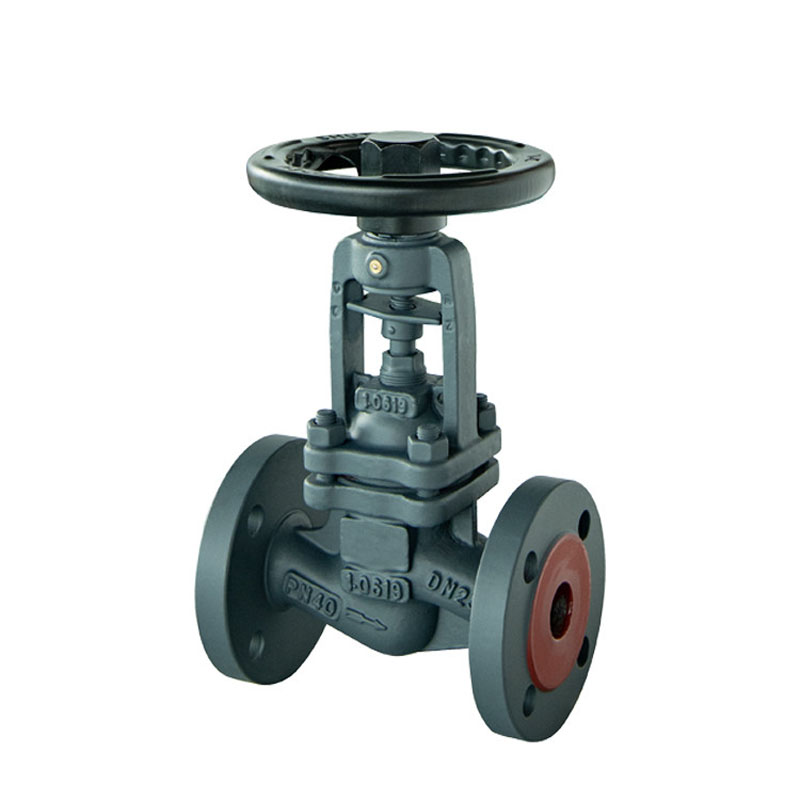هل تبحث عن دليل شامل لصمامات الكرة الأرضية؟ لا مزيد من البحث! يغطي دليلنا كل ما تحتاج لمعرفته حول هذا النوع من الصمامات، بما في ذلك تصميمه وميزاته ومزاياه وتطبيقاته. سواء كنت مبتدئًا أو محترفًا ذو خبرة، فإن دليلنا هو المورد النهائي لفهم الصمامات ذات الكرة الأرضية العالية وكيف يمكن استخدامها في مختلف الصناعات.
تعد صمامات الكرة الأرضية الخوار نوعًا مبتكرًا من الصمامات ذات أداء إغلاق متميز، وتتميز بمنفاخ معدني مرن يمنع التسرب مع حماية ساقها من التآكل. ونتيجة لذلك، فإن هذا النوع من الصمامات يمثل حلاً ممتازًا لخطوط الأنابيب التي تحمل مواد خطرة أو قابلة للاشتعال في درجات حرارة مرتفعة وكذلك حيث تتطلب وسائط النظام تسخينًا كبيرًا.
دعونا نلقي مراجعة تفصيلية لصمامات الكرة الأرضية أدناه.
الصمام الكروي السفلي هو نوع من الصمامات المصممة لتنظيم أو التحكم في تدفق السوائل عبر خط الأنابيب. ويتكون من جسم على شكل كرة أرضية، وختم خوار، وساق متصل بقرص أو سدادة. يعد الختم السفلي مكونًا مرنًا مصممًا لتوفير مانع تسرب حول الجذع، مما يمنع تسرب السائل من الصمام.
الصمام الكروي السفلي هو نوع من صمامات الأنابيب المزودة بختم داخلي منفاخ للحماية ضد التسرب ولحماية ساقها من التآكل، مما يطيل عمرها الافتراضي.
تأتي الصمامات الكروية ذات الأحجام والمواد المختلفة لتطبيقات مختلفة؛ يعد اختيار أفضل ما يلبي متطلباتك أمرًا أساسيًا لتحقيقها بنجاح.
هناك أنواع مختلفة من صمامات الكرة الأرضية. يتم تقسيمها عادةً حسب نوع الجسم ومواد البناء وعدد المقاعد وطريقة التنشيط.
تتكون الصمامات الكروية من غطاء محرك السيارة، والجسم، والساق، والمقعد، والقرص أو القابس، وكلها متصلة ببعضها البعض بواسطة سيقان متحركة عموديًا لفتحها أو إغلاقها.
صمامات الكرة الأرضية السفلية هي صمامات مصممة خصيصًا تستخدم في الصناعات التي تكون فيها مخاطر التسرب عالية. وتشمل هذه الصناعات محطات الطاقة النووية، والمرافق الكيميائية، وخدمات معالجة المياه، وشركات النفط - من بين صناعات أخرى.
يستخدم صمام الكرة الأرضية المشكل منفاخًا معدنيًا كختم ضد تسرب الجذع، مما يوفر نظام ختم مزدوج يساعد في القضاء على مخاطر التسرب مع إضافة تدابير السلامة للوسيط الذي يتم نقله من خلاله.
يتم تصنيع المنفاخ الملحوم باستخدام أشكال مختلفة من المعدن المرن ويمكن أن يأتي في مجموعة متنوعة من الأحجام وأنواع السبائك المصممة لتحمل البيئات القاسية المختلفة.
غالبًا ما يتم استخدام هذه المنافيخ الملحومة في التطبيقات التي تتطلب حلول إغلاق مرنة نظرًا لقدرتها على الثني في اتجاهات متعددة واستيعاب مستويات الضغط ودرجة الحرارة المختلفة. علاوة على ذلك، تتوفر معدلات زنبركية مختلفة لتلبية مستويات مختلفة من الضغط أو درجة الحرارة.
للمنفاخ المعدني العديد من التطبيقات الصناعية والميكانيكية. يمكن لهذه الأجزاء الدقيقة أن تمتص التمدد الحراري والاهتزازات والحركات للحفاظ على عمل المعدات بفعالية.
المنافيخ الملحومة هي شكل دقيق للغاية من علم المعادن الدقيق الذي يمكن تصنيعه باستخدام مواد غريبة مختلفة. تكمن ميزتها في قوة الشد الفائقة، ومقاومتها للشقوق والخدوش، فضلاً عن مرونة أكبر من المنفاخ المُشكل.
المنافيخ المطاطية عبارة عن أختام مرنة تستخدم لحماية الهياكل الميكانيكية من البيئة مع السماح بالحركة. توجد عادة في صناعات مثل الصناعة والنقل.
يمكن تصنيع المنفاخ المقولب باستخدام مواد مختلفة، بما في ذلك المطاط الطبيعي والنيوبرين (r). يوفر كل منها مستويات مختلفة من مقاومة الزيت واللهب وأشعة الشمس/الأوزون.
تُستخدم الصمامات الكروية المنفاخية على نطاق واسع في العديد من الصناعات والتطبيقات نظرًا لقدرتها على توفير درجة عالية من الختم والموثوقية. تتضمن بعض التطبيقات الشائعة لصمامات الكرة الأرضية ما يلي:
تُستخدم الصمامات ذات الكرة الأرضية على نطاق واسع في الصناعات عبر العديد من التخصصات لتنظيم تدفقات السوائل.
تُعد هذه الصمامات طريقة مثالية للتعامل مع الوسائط الخطرة دون المخاطرة بالتسرب، الأمر الذي قد يشكل خطورة على العمال والبيئة على حدٍ سواء.
توفر الصمامات ذات الكرة الأرضية حلاً اقتصاديًا للصناعات ذات احتياجات نقل السوائل المعقدة. فهي ليست فقط متينة وتتطلب القليل من الصيانة، ولكنها أيضًا وسيلة اقتصادية لحماية السوائل الحساسة، مثل السوائل السامة، من الانسكاب أو التسرب.
إن صمامات الكرة الأرضية ذات الارتفاع العالي مطلوبة للغاية نظرًا لبنيتها المتينة وتشغيلها الموثوق، بالإضافة إلى انخفاض احتياجات الصيانة، مما يساعد على تقليل تكاليف التشغيل مع تقليل تكاليف التوقف ووقت التوقف عن العمل أيضًا.
بالإضافة إلى ذلك، يمكن لهذه الحاويات أن تتحمل درجات الحرارة والضغوط العالية - مما يجعلها مناسبة لنقل السوائل المسببة للتآكل أو السامة أو الخطرة.
الصمامات الكروية السفلية هي صمامات صناعية تستخدم لتنظيم تدفق السوائل داخل الأنظمة. إنها تأتي في مجموعة متنوعة من الأحجام والمواد مع معدلات ضغط مختلفة لتسهيل التحكم.
تتميز الصمامات الكروية ذات الجودة العالية بالعديد من المزايا والميزات التي تجعلها جذابة، مثل عدم التسرب، ومقاومة التآكل، والتشغيل بدون صيانة. علاوة على ذلك، يمكن لهذه الصمامات التحكم في العديد من العمليات والسوائل بكفاءة - وهي ميزات تجعلها خيارًا شائعًا في العديد من الصناعات.
تعتبر السلامة ذات أهمية قصوى في العديد من الصناعات، وقد تم إنشاء الصمامات الكروية السفلية مع أخذ ذلك في الاعتبار. قادرة على تحمل درجات الحرارة والضغوط العالية، مما يجعلها مناسبة لمختلف التطبيقات، تشير هذه الصمامات الكروية ذات الارتفاع العالي إلى أن السلامة يجب أن تأتي دائمًا في المقام الأول.
تشمل فوائد السلامة لأنظمة مراقبة التلوث منع الانبعاثات الضارة والقضاء على مخاطر التسرب من خطوط أنابيب السوائل مع تقليل خسائر المواد أثناء العمليات وزيادة الإنتاجية في نفس الوقت.
تختلف الصمامات الكروية السفلية عن الصمامات العادية من خلال احتوائها على منفاخ معدني مرن يوفر ختمًا مانعًا للتسرب ويحمي جذعها من التآكل، مما يساعد على ضمان التشغيل السلس ومنع تلف الصمام نفسه. تضمن هذه الميزة استخدامًا خاليًا من التلف.
واستنادا إلى تطبيقاتها، يمكن بناء المنظمات من مواد مختلفة. على سبيل المثال، غالبًا ما يتم استخدام الفولاذ المقاوم للصدأ لتنظيم السوائل المسببة للتآكل عند درجات حرارة وضغوط أعلى، بينما توفر المنظمات البلاستيكية تجربة تركيب وصيانة سهلة مع كونها مناسبة للبيئات الخطرة أو المتفجرة.
